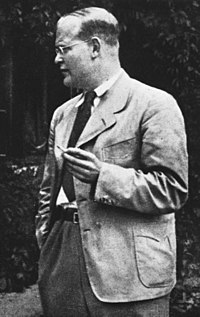Dietrich Bonhoeffer
| Dietrich Bonhoeffer | |
|---|---|

Dietrich Bonhoeffer in 1939
|
|
| Pronunciation | German: [ˈdiːtʁɪç ˈboːnhœfɐ] |
| Born |
4 February 1906 Breslau, Province of Silesia, Prussia, German Empire |
| Died | 9 April 1945 (aged 39) Flossenbürg concentration camp, Nazi Germany 49°44′06″N 12°21′21″E / 49.734958°N 12.35577°E |
| Education | Staatsexamen (Tübingen), Doctor of Theology (Berlin), Privatdozent (Berlin) |
| Religion | Lutheranism |
| Church |
Evangelical Church of the old-Prussian Union (1906-1933) Confessing Church (1933-1945) |
| Writings | Author of several books and articles (see below) |
|
Congregations served
|
Zion's Church congregation, Berlin German-speaking congregations of St. Paul's and Sydenham, London |
|
Offices held
|
Associate lecturer at Frederick William University of Berlin (1931–36) Student pastor at Technical College, Berlin (1931–33) Lecturer of Confessing Church candidates of pastorate in Finkenwalde (1935–37) |
| Title | Ordained pastor |
Dietrich Bonhoeffer (German: [ˈdiːtʁɪç ˈboːnhœfɐ]; 4 February 1906 – 9 April 1945) was a German Lutheran pastor, theologian, anti-Nazi dissident, and key founding member of the Confessing Church. His writings on Christianity's role in the secular world have become widely influential, and his book The Cost of Discipleship has become a modern classic.
Apart from his theological writings, Bonhoeffer was known for his staunch resistance to Nazi dictatorship, including vocal opposition to Hitler's euthanasia program and genocidal persecution of the Jews. He was arrested in April 1943 by the Gestapo and imprisoned at Tegel prison for one and a half years. Later he was transferred to a Nazi concentration camp. After being associated with the plot to assassinate Adolf Hitler, he was quickly tried, along with other accused plotters, including former members of the Abwehr (the German Military Intelligence Office), and then executed by hanging on 9 April 1945 as the Nazi regime was collapsing.
Bonhoeffer was born on 4 February 1906 in Breslau (now Wrocław, Poland), into a large family. In addition to his other siblings, Dietrich had a twin sister, Sabine Bonhoeffer Leibholz: he and Sabine were the sixth and seventh children out of eight. His father was psychiatrist and neurologist Karl Bonhoeffer, and his mother Paula Bonhoeffer, née von Hase, was a teacher and the granddaughter of Protestant theologian Karl von Hase and painter Stanislaus Kalckreuth. His oldest brother Karl Friedrich Bonhoeffer became a chemist, and, along with Paul Harteck, discovered the spin isomers of hydrogen in 1929. Walter Bonhoeffer, the second born of the Bonhoeffer family, was killed in action during World War I, when the twins were 12. The third Bonhoeffer child, Klaus, was involved in the 20 July plot to assassinate Adolf Hitler, along with Dietrich; he, too, was executed by the Nazis. Both of Bonhoeffer's older sisters, Ursula Bonhoeffer Schleicher and Christel Bonhoeffer von Dohnanyi, married men who were eventually executed by the Nazis. Christel was imprisoned by the Nazis but survived. Sabine and their youngest sister Susanne Bonhoeffer Dress each married men who survived Nazism. His cousin Karl-Günther von Hase was the German Ambassador to the United Kingdom from 1970 to 1977.
...
Wikipedia
